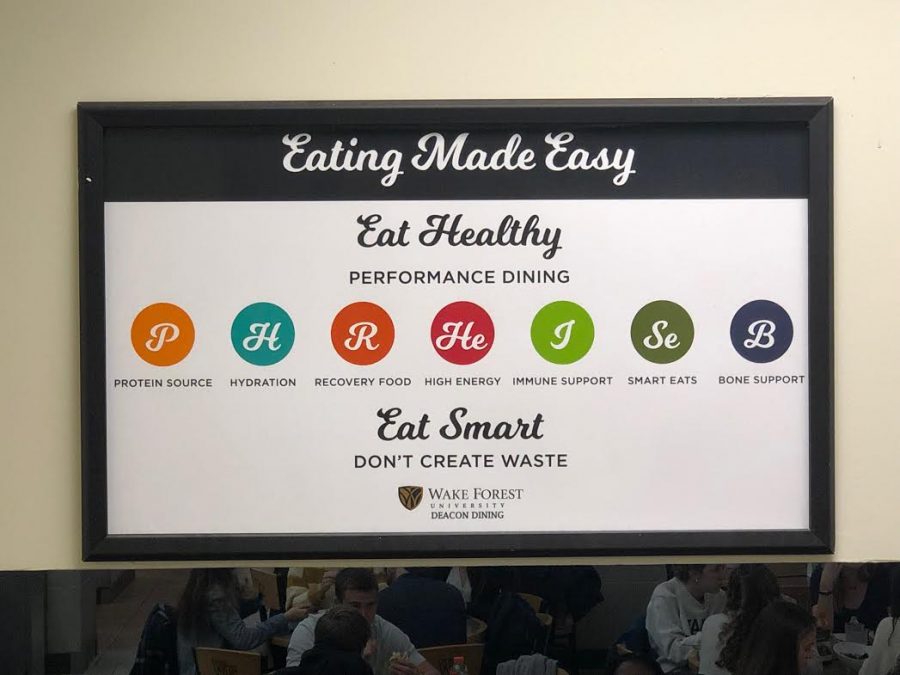Wake Forest’s shift to a plant-forward dining focus is enabling students to have more control over their dietary choices and thus how their personal behavior affects climate change.
Performance Dining is Aramark’s platform to help students “eat with a purpose.” The recent re-brand of Aramark on campus, Harvest Table, helps achieve this mission by focusing on additive-free, local, sustainable, chef-inspired cuisine.
This platform’s inclusion of plant-forward dining encourages students to focus on the health benefits of greater plant intake, recommending one-fourth of a plate to be protein, half of which is plant-based.
“This change towards plant-forward dining is a drive within Aramark from a corporate perspective,” said Resident Manager of Aramark Dining Services Tim Vandermeersch, “but is given more concentration here [on Wake Forest’s campus] due to our partnership with the Office of Sustainability.”
Carbon dioxide accounts for 81 percent of greenhouse gas emissions, which is the leading cause of rising average global temperatures. The greenhouse effect, according to NASA, is the trapping of the sun’s warmth within Earth’s atmosphere, functioning as a thick blanket. This global warming has caused the planet’s average surface temperature to rise 1.8 degrees Fahrenheit in the last 120 years.
Out of the top 10 foods with the largest ecological footprint, eight are animal byproducts, seven of which are meat. For example, production of one kilogram of lamb emits the same emissions as driving a car for 91 miles. Fruits, vegetables, beans and nuts have much lower carbon footprints. Plant-forward dining, a style of cooking and eating that emphasizes and celebrates plant-based foods, is working to reduce the carbon footprint of Americans’ diet.
A global commitment to eating a vegan diet would bring a 70 percent reduction in greenhouse gas emissions. Although encouraging veganism or vegetarianism is not a goal of plant-forward dining, educating diners on plant protein alternatives is fundamental to the movement. Edamame, tofu, beans, nuts, seeds, whole grains and legumes are all examples of plant proteins.
“The 336 Market now carries my favorite dairy-free yogurt and vegan granola bars,” said senior Alexandra Miller. “My freshman year, there were hardly any options for my vegan diet.”
Miller says the change in taste and quality of food is enabling her to live a healthier lifestyle. The recent addition of the vegan station to the Pit helped elect Wake Forest as one of PEETA’s Top 10 vegan campuses in 2018, yet some still find the options unsatisfactory.
“It is very hard being vegan here,” said junior Makenna Dixon-Essien. “I find myself snacking a lot more when at school because I don’t get the nutrients I need to sustain this lifestyle. The vegan station’s limited hours make it difficult to schedule my meals because I also have work, lab and class.”
Dixon-Essien said that following a visit with her doctor over summer break, it was decided that she’d need to start incorporating some sort of high protein into her diet. Now, she will occasionally eat seafood in order to get protein and vitamins.
Campus dining sustainability efforts not only focus on climate change. Junior McKenzie Webster serves as a peer educator for the Office of Wellbeing so that she can help promote student wellbeing on campus.
“I’m a vegetarian myself and try to eat as many whole plant-based foods as possible,” Webster said. “I am passionate about health and well-being and wanted to teach others how to have a sustainable lifestyle, too.”
The Global Food Committee hosts a global food tabling station in the Pit twice a month to expose students to food from different cultures. These recipes are contributed by students and then executed by Aramark.
“Our purpose is for people to try and learn about different cultures in a safe environment,” said chair of the committee Gail Bretan.
“People open up over sharing food, and we want to bring people together to try new things.”
This mission relates to campus dining’s sustainability efforts in that it works to enhance taste and community, both components of “eating with a purpose,” according to campus nutritionist Brooke Orr.
Aramark’s ultimate goal is to reduce the school’s carbon footprint without losing quality or taste.










